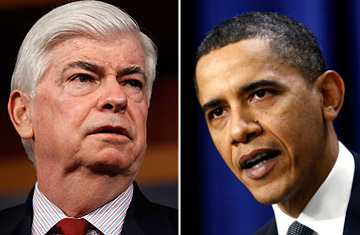
Senate Banking Committee Chairman Christopher Dodd announced Thursday that he can't keep negotiating a financial reform compromise with Republican senator Robert Corker, because the process needs to go faster. Corker then declared that he was "very disappointed" the talks had broken down, and that the process needs to go slower.
Are we really supposed to be surprised the compromise didn't happen?
Financial reform is an extremely complex issue, substantively and politically, but a few simple things can be said about it. Republicans have vowed to block any independent consumer protection agency with enforcement authority, while President Obama and many Democrats have insisted on one. Republicans don't want to hand Obama a victory; even before they lost their supermajority, Democrats didn't want to repeat the ugly get-to-60 process that squeezed health care reform through the Senate. Democrats are ideologically inclined to support strict regulations; Republicans, not so much — one reason none of them voted for the reform bill that passed the House last year.
The stars, in other words, were not exactly aligned for a backroom bipartisan deal. Dodd tried anyway — first with Richard Shelby, the ranking Republican on his committee, and after that crashed and burned, with Corker, a junior member of the committee who seemed more open to a compromise. Over the last several weeks, they did manage to reach agreement on some less controversial elements of reform, such as systemic risk regulation and rating agency liability, but it was never clear how they would bridge fundamental differences like the consumer agency, derivatives regulations and shareholder protections. When I spoke to Corker last month, he suggested that Obama's relatively modest proposal to recoup the costs of the financial bailouts by taxing the risk-taking of large banks made him wonder if he was living in Venezuela. And he's considered one of the softer-edged Republicans.
Even if Dodd had agreed to water down reform enough to cut a deal with Corker, that wouldn't have guaranteed success; it was not clear if any other Republicans would have supported it, if Democrats on his committee would have agreed to pass it, if it could have survived the full Senate, if the Senate would have been able to work out its differences with the House in a conference, if the Senate and House would have been able to pass the resulting conference bill, or if Obama — whose aides have suggested they'd much prefer no bill (and a potentially powerful issue they could use to bash Republicans in the run-up to the midterm elections) to a weak bill — would have signed the compromise. And time was a serious factor; Congress probably needs to complete its legislative business before campaign season kicks into high gear in August.
Dodd is not naï ve; he knew that ostensibly softer-edged Republicans like Senator Charles Grassley had drawn out health care negotiations for months before scuttling the talks with tea-party rhetoric about grannycide. But Dodd is retiring after 36 years in the Senate, and he was eager to cut a deal for the sake of his legacy. He knew he needed GOP votes, and he figured that after a catastrophic meltdown, financial reform would be less polarizing than health care. And Corker did seem to be negotiating in good faith, even if GOP leaders were clearly eager to pull the football away before Charlie Brown could kick.
In fact, Dodd said Thursday that he's still optimistic about a consensus bill. He hinted that when he unveils his draft on Monday, it will reflect the compromises he's already made with Corker. But common sense, as well as leaks from their talks, suggest that those compromises — stripping the consumer agency of enforcement power, exempting payday lenders from new regulations, blocking any state regulations that are stricter than federal ones — would remove teeth from the bill. And perversely, that would make consensus — which is pretty unlikely anyway — just about impossible.
